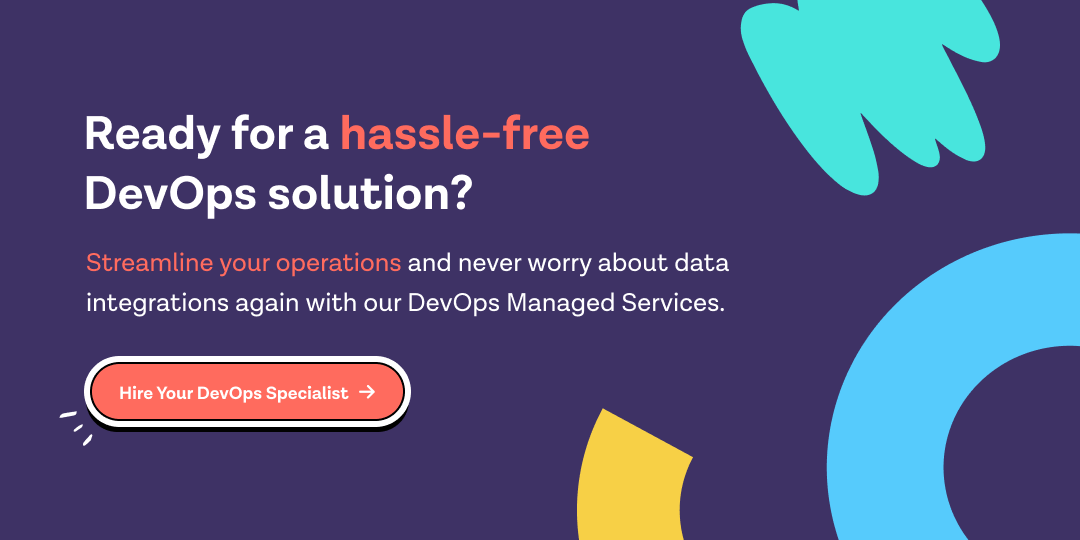DevOps has emerged as a transformative methodology for organizations that deal with software development. By integrating development and operations teams and facilitating continuous improvement and deployment, DevOps can significantly accelerate the software development lifecycle while improving product quality.
However, the potential of DevOps can only be fully realized through the right talent. As the tech landscape evolves, companies are increasingly struggling to staff their DevOps teams—how do you find experts who have the technical skills and embody the culture and practices of DevOps?
Navigating the intricacies of DevOps staffing may seem like a daunting task, but it doesn't have to be. Read on to discover the vital roles of a DevOps team, how to overcome the challenges of finding qualified staff, and how Talentcrowd can help you build a team geared for continuous improvement and success.
The Importance of DevOps
DevOps is more than just a buzzword; it's a set of best practices that can revolutionize how your organization builds, tests, and deploys software. Adopting DevOps in today's highly competitive environment cannot be overstated.
Faster Deployment and Releases
One of the most compelling benefits of DevOps is speed. DevOps practices like Continuous Integration and Continuous Deployment enable faster development cycles and more frequent code releases. This agility allows businesses to respond more effectively to market changes and customer demands. DevOps practices offer a significant edge in an age where speed-to-market can be a powerful differentiator.
Improved Collaboration
Traditional models often have development and operations working in silos, leading to misunderstandings and delays. DevOps breaks down these silos and fosters a culture of collaboration and shared responsibility. When teams work together, there's better communication, and problems are resolved more quickly, resulting in a more efficient workflow.
Better Resource Utilization
DevOps encourages automation, which speeds up routine tasks and reduces the likelihood of errors. This automation lets your team focus on solving complex problems rather than getting bogged down with everyday tasks. Additionally, better resource utilization can be achieved through containerization and orchestration tools like Docker and Kubernetes, making your systems more efficient and cost-effective.
Enhanced Quality and Reliability
Quality assurance is integrated into the DevOps workflow, leading to more robust and reliable software. Automated testing and real-time monitoring are part and parcel of a DevOps approach, ensuring that issues are identified and addressed as soon as they arise.
Adopting DevOps is not just about speeding up the development process; it's about transforming your organizational culture to be more agile, collaborative, and responsive to market needs.
What is “DevOps Staffing”?
DevOps staffing refers to hiring and assembling a specialized team of professionals who embody the principles of DevOps culture: collaboration, automation, measurement, and sharing. But it's not just about filling positions; it's about finding the right talent that aligns with your organization's culture, goals, and technical requirements. In DevOps staffing, each role is critical to establishing a seamless loop between development and operations, enhancing your software development lifecycle.
The Anatomy of a DevOps Team
In a DevOps culture, team roles are often fluid, underscoring the importance of cross-functional skills. However, specific roles and responsibilities do exist to guide the DevOps process, ensuring that the code not only functions but flows through the pipeline seamlessly.
DevOps Engineer
The DevOps Engineer is often considered the backbone of a DevOps team. This role bridges the gap between the development and operations departments, ensuring a smooth transition from code development to deployment. They usually have a strong software engineering background and experience in system administration.
Systems Administrator (SysAdmin)
SysAdmins are responsible for configuring, managing, and maintaining the system environment. While they traditionally fall under DevOps's 'Operations' side, their role is increasingly becoming code-centric, blurring the lines between development and operations.
Automation Tester
Quick releases and constant code changes are the norms in a DevOps environment. Automation Testers ensure that this rapid pace keeps the quality of the software high. They write automated test scripts and are crucial for implementing continuous testing within the DevOps pipeline.
Security Engineer
Also known as "DevSecOps," the Security Engineer integrates security measures directly into the development process. This proactive approach to cybersecurity ensures that security is considered at every stage of the software lifecycle rather than being tacked on at the end.
Build and Release Engineer
This role focuses on compiling, assembling, and delivering source code into finished products or other software components. They ensure the code is staged correctly and reliably pushed into the production environment.
Infrastructure Architect
An Infrastructure Architect designs and outlines the architecture needed in the production environment. They ensure the infrastructure scales and performs well under the expected load.
Product Managers
Their role is to understand the customer needs and translate them into tasks and goals for the DevOps team. They are essential for defining the project scope and ensuring alignment with business objectives.
At Talentcrowd, we understand the complexities involved in staffing a DevOps team. Our rigorous vetting process ensures that we provide you with top-tier talent that excels in these roles and seamlessly integrates into your existing processes and culture. With Talentcrowd, you're not just getting experts; you're gaining partners who will drive your DevOps initiatives to success.
Challenges in Staffing a DevOps Team
Finding the right talent in an ever-evolving field like DevOps is more than just ticking off skill set boxes. Several challenges crop up when companies try to staff their DevOps teams.
The Skill Gap
DevOps is inherently interdisciplinary, requiring a blend of skills from coding to system administration to security. This vast skill set is often hard to find in a single individual, leading to gaps that impact performance.
Culture Fit
DevOps isn't just a role or a set of tasks; it's a culture. The ideal candidate must have the technical skills and fit into a culture of collaboration, continuous learning, and agile development.
Rapid Evolution
DevOps is continually changing, with new tools, technologies, and methodologies emerging frequently. A significant challenge is staffing a team with professionals who can keep up with these changes.
Remote vs. Onsite Staffing
The question of whether to opt for remote or onsite staffing in DevOps is more relevant than ever. Remote work is becoming increasingly popular, but it’s not without its challenges.
Advantages of Remote Staffing
- Widened Talent Pool: Remote staffing opens up access to talent beyond your local area, making it easier to find specialists.
- Cost-Effectiveness: Reduce overhead costs related to infrastructure and maintenance.
- Flexibility: Remote teams offer valuable flexibility, particularly in continuous monitoring settings in DevOps.
Challenges of Remote Staffing
- Communication: Time zones can complicate matters.
- Security: Additional measures are needed to secure data and communication channels.
Advantages of Onsite Staffing
- Immediate Access: Having your DevOps team onsite can be crucial for quickly addressing urgent issues.
- Team Cohesion: There's often a stronger sense of team cohesion when everyone is physically present.
Challenges of Onsite Staffing
- Overhead Costs: The cost of onsite staff is typically higher than remote staffing.
- Limited Talent Pool: Restricted to geographic location.
The Onboarding Process
Onboarding new DevOps staff is not just an administrative box to check but a strategic opportunity to create a culture of excellence, collaboration, and agility. The onboarding process is an invaluable window to acclimate your new hires to their technical responsibilities, the company culture, and the collaborative essence that DevOps embodies.
To make sure you don’t miss a step, check out our Crack The Code Checklist for hiring new developers.
Tips for Integrating New DevOps Staff
Orientation and Training
Begin with a comprehensive orientation that overviews the company's mission, objectives, and ongoing projects. Equip your new hires with the tools and knowledge they need for their roles. Consider running a training program that walks them through the DevOps tools and practices currently in use within your organization.
Pairing and Mentorship
Assign mentors to new hires for the first few weeks. This pairing helps new staff quickly get up to speed with existing projects and internal processes. It also creates a supportive environment that encourages questions and clarifications.
Regular Check-ins
Frequent one-on-one check-ins during the initial weeks can be very effective in ensuring that the new staff is comfortable and on the right track. These meetings are also an opportunity to give and receive feedback making any necessary adjustments in the onboarding process.
Hands-On Tasks
Incorporate some more minor, manageable tasks into their initial workload. This will help them familiarize themselves with the projects and instill a sense of accomplishment and ownership right from the start.
The Importance of Cultural Fit in DevOps
DevOps is as much about culture as it is about technical expertise. Teams must collaborate closely, break down silos, and share responsibilities. This makes the cultural fit extremely critical. A team that resonates on both professional and cultural levels is more likely to be efficient, collaborative, and, ultimately, successful.
At Talentcrowd, we prioritize cultural fit as much as technical competence during our selection process. We understand that for a DevOps initiative to be truly successful, each team member must align with your organization’s culture and values. That’s why we invest the time to get to know your organization, enabling us to match you with candidates who fulfill the job description and seamlessly integrate into your team dynamics.
With a thoughtful onboarding process and a focus on cultural alignment, your DevOps team will be well-positioned to drive your organization toward greater efficiency, agility, and innovation.
Training and Upskilling
In a fast-evolving tech landscape, continuous learning is not a luxury but a necessity, especially in DevOps. Technologies, tools, and best practices change almost overnight, and DevOps professionals must stay updated to adapt, innovate, and ultimately add value to their organizations. Training and upskilling, therefore, play an integral role in the ongoing efficacy of a DevOps team.
The Importance of Continuous Learning in DevOps
Adaptability
DevOps is inherently about breaking down barriers and creating a more agile, responsive environment. Constant learning enhances adaptability, enabling teams to adopt new tools and methodologies as they emerge.
Security and Compliance
With new threats emerging regularly, continuous learning helps DevOps teams stay ahead of potential security vulnerabilities, ensuring they can better safeguard the organization’s data and infrastructure.
Efficiency and Productivity
As team members enhance their skills, they become more efficient, reducing the time needed to manage infrastructure, deploy software, and troubleshoot issues. This increase in productivity can directly impact the bottom line.
Employee Satisfaction
When an organization invests in the professional development of its team, it not only improves its operational capabilities but also enhances employee satisfaction and retention.
Future Trends in DevOps Staffing
As we look ahead, it's clear that DevOps is not a static field. The scope of what DevOps teams are expected to manage and optimize is continuously expanding. Several trends are poised to significantly influence the domain of DevOps staffing in the near future.
Automation
Automation has been at the heart of DevOps since its inception, and its importance is only increasing. As infrastructures grow more complex, automation tools that handle everything from configuration management to deployment are becoming indispensable. Staffing needs will tilt toward professionals with a solid grounding in automation tools and scripting languages, enabling more efficient, error-free operations.
AIOps
Artificial Intelligence for IT Operations (AIOps) is a field that applies machine learning and data analytics to IT operations, including DevOps. As AIOps becomes more mainstream, DevOps teams will need staff members skilled in machine learning algorithms and data analytics to harness the full potential of AI-driven operational insights.
DevOps Managed Services
More companies are looking to outsource certain DevOps functions to managed service providers to focus on core competencies. While this might reduce internal staffing needs, the opposite is also true. Organizations will need in-house experts to liaise with these managed service providers effectively, ensuring that the services align with the company’s goals and compliance requirements.
DevSecOps
With the increasing frequency and sophistication of cyber threats, security is no longer a siloed function but an integral part of DevOps, known as DevSecOps. This integration will create a demand for professionals who are not just adept at development and operations but are also well-versed in cybersecurity practices.
How These Trends Impact Staffing
Adapting to these trends will require a nuanced approach to staffing. You'll need to look for or train multi-skilled professionals, often described as 'T-shaped,' with deep expertise in one area and a good understanding of several others. Also, as these trends evolve, continuous upskilling becomes non-negotiable. It ensures your team can leverage new tools and technologies, maximizing efficiency and reducing time-to-market.
These trends underscore the ever-evolving nature of DevOps, demanding a forward-thinking approach to staffing that can accommodate rapid technological changes.
How Talentcrowd Can Help
Navigating the complex landscape of DevOps talent can be a daunting task. The fusion of skill sets required, ranging from coding to system administration to cybersecurity, makes it essential to be discerning when bringing new team members on board. At Talentcrowd, we've developed a meticulous vetting process that does the heavy lifting for you.
Our approach goes beyond assessing technical proficiencies; we also consider the importance of soft skills like teamwork, problem-solving, and effective communication, which are indispensable in a collaborative environment like DevOps. We analyze your specific needs and work culture to match you with candidates who have the technical expertise and align with your company’s values and goals. By doing so, we ensure you're not just filling a role but adding a valuable team member who will contribute to your long-term success.
If you're ready to take your DevOps strategy to the next level, Talentcrowd is here to help you do just that. We specialize in building DevOps teams that are agile, skilled, and aligned with your business objectives. Contact us today to discover how we can collaborate to build your ideal DevOps team.





